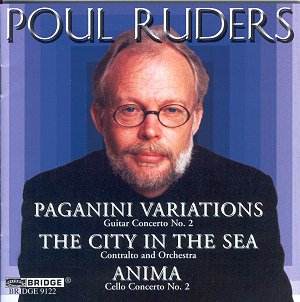The City in the Sea is Ruders’
first setting of a poem by Poe (three years later, he set The
Bells for soprano and ensemble, on Bridge 9057). This is a
quite different setting. The City in the Sea, written
with the present soloist’s voice in mind, is a large-scale dramatic
scene for contralto and orchestra in which Ruders responds to
Poe’s vision in vivid orchestral terms. There are many moments
of imaginative and powerfully evocative orchestral - writing perfectly
suited to Poe’s often gloomy imagery. This is an impressive piece
of gripping, strongly expressive music.
Anima composed in 1993 is Ruders’
second cello concerto. The first cello concerto Polydrama
was written in 1998 as the third part of the so-called Drama
Trilogy written between 1987 and 1988. The other pieces are
Dramaphonia for piano and orchestra and Monodrama
for percussion and orchestra, the latter being – to the best of
my knowledge – still unrecorded. Polydrama was recorded
several years ago (on Unicorn DKP CD 9114, nla at the time of
writing, as far as I know). It is on the whole a more introverted,
often dark-hued and at times bleak piece of music - though essentially
song-like in quality. Anima is more overtly lyrical,
though it too has its share of dynamic contrasts. The keyword,
however, in this marvellous work is ‘song’. The ever-present solo
part, beautifully played here by Michaela Fukacova, is predominantly
and often warmly melodic. Ruders’ superb scoring for traditional
(by his own standards) orchestral forces never obscures the soloist’s
almost endless song. The work develops the initial material through
what the composer refers to as "minimorphoses", ever
renewing and recreating the thematic material. This exhibits parallels
with Holmboe and his own metamorphosis technique. I am in no doubt
that Anima is one of Ruders’ most gripping, though
accessible and warmly expressive works so far.
The same might also be said of the attractive
Paganini Variations; actually Ruders’ second guitar
concerto. The first guitar concerto Psalmodies of
1989 is available on Bridge 9037. There are twenty-two variations
on Paganini’s theme (guess which!) that are in turn dreamy and
animated, serious and playful. The music flows effortlessly and
seamlessly throughout, or so it seems, in the most imaginative
and colourful manner, with sometimes a welcome touch of mild irony
or humour. The solo part, written for David Starobin and for which
a new guitar was constructed by the English guitar builder, Gary
Southwell, is quite demanding but extremely resourceful and perfectly
suited to Ruders’ boundlessly imaginative writing.
I have know Ruders’ music for many years; and,
from the start, I was convinced that he is a lyricist at heart.
That said, in his early works, he often defiantly concealed his
lyricism with a good deal of irony and often whimsical fancy;
sometimes adopting aggressive minimalism or nodding towards "polystylism"
alla Schnittke. Nevertheless, in some works such as Polydrama
or the impressive First Symphony Himmelhoch jauchzend...zum
Tode betrübt, a new seriousness crept into his music,
revealing – I think – his real, inner self. Another striking characteristic
of his music lies in his orchestral mastery. Here is a composer
who obviously enjoys writing for large orchestral forces and who
relishes the many expressive possibilities of present-day symphonic
forces. I firmly believe that he is at his best when writing for
orchestra. This is quite clear, say, in the Solar Trilogy
(Dacapo 8.224054), in the works in Chandos’s selection (CHAN 9179)
and in the magnificent pieces recorded here.
I have no hesitation whatsoever in recommending
this release, Volume 3 of Bridge’s Poul Ruders Edition,
as the best possible introduction to his highly personal, strongly
expressive and often beautiful music, the more so when served
by such excellent performances and recording..
Hubert Culot

![]() for
details
for
details